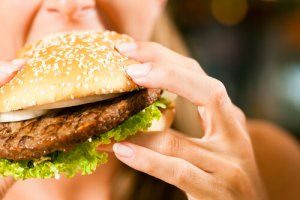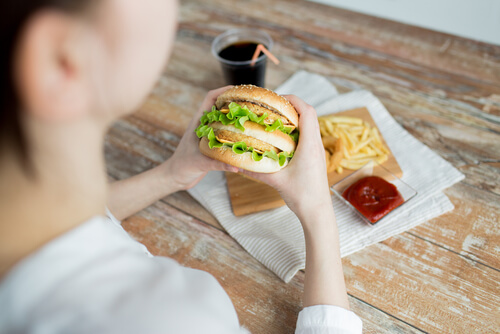Emotional Hunger - Anxiety's Favorite Disguise


Written and verified by the psychologist Gema Sánchez Cuevas
All of us know what hunger feels like. When you have an empty stomach, and you need to put something in your mouth you’re hungry. Of course, you know how to identify situations in which you are really hungry, after not eating for a while. But do you know how to distinguish them from emotional hunger?
Experts don’t recommend going hungry. Nor do they advise going more than four hours without eating, even if it’s just a snack. But you don’t always eat because you are actually hungry. Sometimes you eat to cover up your emotions. Stress, sadness, anxiety… You try to hide them beneath unhealthy food that will make you feel worse in the long run.
Do you want to stop the vicious cycle of eating to feel better, and then feeling guilty because you eat? I encourage you to learn how to tell the difference between emotional hunger and hunger due to a lack of energy in the body. Take the bull by the horns and learn to identify the signs of emotional hunger. Then you can take charge of your life and your eating habits.
Let’s get to know some of the characteristics of emotional hunger.
1. Cravings
Emotional hunger will never ask you to eat a plate of vegetables or a salad. Normally it prompts you to eat high-calorie, nutrient-poor foods. You crave sweets or foods high in saturated fat. In other words, junk food.

2. It’s insatiable
When you notice you are hungry, you usually know how much food you will need to eat. With emotional hunger, however, you can eat until you are overfull. Emotional hunger inhibits feelings of fullness. As a result, we don’t feel full until well after we already are.
3. It attempts to fill a void
This void isn’t exactly in the stomach. It responds to some kind of emotional imbalance. Instead of figuring out what the problem is, it gets buried under all the food we eat in an attempt to make us feel better. The relief is temporary and will last as long as it takes to digest the food. But this can’t last. Once it’s over, we will probably feel worse than we did before.
4. It compels you to eat alone
People almost never binge eat with others around. It’s a kind of ritual that you do by yourself. Often, loneliness itself causes the binge eating. However, you might do it at events like weddings or birthdays to hide your feelings.
5. It makes you feel guilty
You know that you don’t need that bag of potato chips. They will make your cholesterol go up, they are full of saturated fat, and to top it all off, you aren’t even hungry. You know all this, but you can’t beat the craving. When we eat this type of food we feel guilty. We feel the need to punish ourselves for losing control.
6. It is impulsive
When you eat to satisfy emotional hunger, you do it without thinking too much. It is impulsive. You run into the store and buy everything that looks good to you that day.
7. You use it to avoid responsibilities
You have to work, you promised to go to the gym, or to study… But you don’t feel like it and you end up staying home. Deep down you know that you haven’t done what you said you would. Anxiety won’t wait long to knock on your door and keep you company. That’s when you visit the fridge. You are looking for that thing you crave, something to calm you down.
Once you’ve eaten something bad for you you realize that you feel worse. Now you feel guilty for two things – not having fulfilled your obligation, and giving in to your craving. What’s more, you realize that while you were eating you didn’t feel anxious. So, you go back to the fridge for more… and you repeat the process until you are very, very full.
Ideas to satisfy your emotional hunger without raiding the fridge
All of these traits are linked with emotional hunger. You just have to look for them in your own habits to be able to identify the problem. Then it’s time to fight the problem. Here are some ideas to help you.
1. Try eating something healthy
If you want to eat, but you think it’s because of emotional hunger, test it with something healthy. If you aren’t physically hungry, either you won’t eat, or you will get full really fast. Your body will tell you that it isn’t what you want. Then you’ll know for sure that the hungry feeling isn’t real.

2. Think about what might be causing the problem
When you know that you are experiencing a craving and not real hunger, think about what might be the root of the problem. Are you anxious about work? Relationship problems? Have you been running around all day without stopping?
3. Exercise
Exercise helps in two ways. First, it’s a way to release negative emotions. Exercise produces endorphins that improve your mood. Endorphins also help combat anxiety. After exercise, your body needs energy and will be thrilled to get some healthy food.
4. Make a meal plan
This will help you avoid impulse eating. If you keep track of when and how you eat, you will have a better sense of when you actually need to recharge. That will make it harder for your body to trick you. In addition, you will already have chosen what to eat, so it’s more likely to be an intelligent decision.
5. Give in to a craving every once in a while
Though emotional hunger usually responds to junk food, it’s good to give in to your cravings every once in a while. Just make sure it doesn’t become a habit.
6. Eat with other people
When you eat with other people, you eat more slowly. Also, you probably won’t focus exclusively on your problems. Another benefit is that you divide the enjoyment between the company you are in and the food you are eating. Thus, it won’t be necessary to keep eating to feel better.

7. Don’t use food as a reward
Sometimes when you’ve had a bad day, you try to make yourself feel better by eating junk. You tell yourself “I deserve this.” If you get used to making up for a bad day with junk food, you won’t be able to focus on developing more healthy eating techniques.
8. Get help with the underlying emotional problem
Whether it’s a friend, family member, partner, or a professional find someone to help you. Your attempts to hide the problem and deal with it alone haven’t worked.
9. Think before you buy junk food
Why am I buying this? Do I really need it?
10. Take a shopping list of what you actually need
And don’t buy anything more than what is on the paper. We usually don’t write our cravings down. They tend to be the result of an impulsive act.
The best technique is definitely being aware of your body’s true needs and knowing if they correspond to your physical or emotional body. It’s important to proactively deal with difficult emotional situations. You have to figure out the root cause and then decide how you will deal with it. Instead of eating your feelings, work on having a physically and mentally healthy life.
This text is provided for informational purposes only and does not replace consultation with a professional. If in doubt, consult your specialist.








